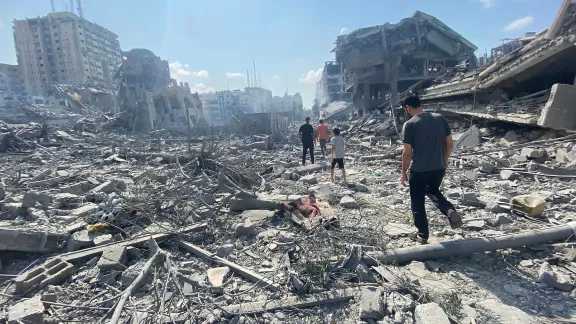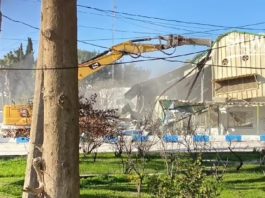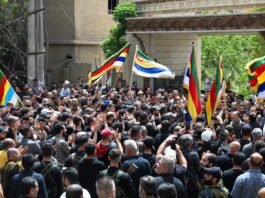A Dire Humanitarian Situation in Gaza
The ongoing conflict in Gaza has led to an alarming humanitarian crisis that has left millions in dire need of assistance. Escalating violence and military operations have resulted in significant loss of life and widespread displacement, severely disrupting the basic living conditions of the civilian population. Basic infrastructure has been significantly damaged, leading to a breakdown in essential services such as healthcare, water supply, and sanitation. According to recent reports, access to clean water has become limited, making it increasingly difficult for families to maintain proper hygiene and health, resulting in heightened risks of waterborne diseases.
Malnutrition has become a pressing concern, particularly among vulnerable groups such as children and the elderly. These populations are often the most affected by food shortages, compounded by the blockade and restrictions on the movement of goods and humanitarian supplies. Children, who make up a substantial portion of Gaza’s population, are particularly at risk, facing not only immediate health threats due to lack of nutrition but also long-term developmental setbacks. The psychological impact of the ongoing violence, including trauma and anxiety, further exacerbates their plight, making urgent intervention necessary.
The humanitarian needs in Gaza are escalating rapidly, outpacing the current capacity of local and international aid organizations. These organizations are confronting significant challenges in delivering aid, including security risks, logistical obstacles, and limited access to affected areas. The complex and volatile situation renders it increasingly difficult to provide timely assistance to those in need. Consequently, there is an urgent appeal for enhanced humanitarian aid and support for Gaza, aimed at alleviating the suffering of its people and restoring basic living conditions for all affected individuals.
The Impact of New Evacuation Orders
Recent evacuation orders issued in Deir al Balah have significantly intensified the already precarious situation for local residents. These orders compel individuals and families to abandon their homes, often with little warning and no means of adequate relocation. The forced evacuation places an immense strain on an already vulnerable population, increasing their exposure to danger and diminishing their access to essential resources. Displacement is particularly alarming in the context of ongoing military operations, which have spurred a surge in casualties and injuries among civilians.
This evacuation directive not only disrupts the daily lives of those affected but also hampers the vital work of humanitarian organizations operating in the region. The United Nations and various NGOs face considerable logistical challenges as they attempt to deliver humanitarian aid to those in need. The evacuation orders make it difficult to establish safe routes for aid distribution, as shifting populations may lead to increased violence and instability. Consequently, vital supplies, including food, water, and medical assistance, may not reach the most vulnerable individuals.
The situation is exacerbated by the psychological toll on the residents. With uncertainties hanging over their future, the fear of violent conflict looms large, contributing to a profound sense of despair and helplessness. Humanitarian workers endeavor to navigate these dangerous circumstances while responding to the urgent needs of the population. Yet, the multifaceted challenges posed by the evacuation orders impede their effectiveness, jeopardizing efforts to alleviate suffering in the region. The coordination of humanitarian aid has become increasingly complex, necessitating adaptive strategies to ensure that the critical assistance reaches those who need it most promptly.
International Obligations and Humanitarian Law
The ongoing humanitarian crisis in Gaza highlights the pressing need to reflect upon the obligations imposed by international humanitarian law (IHL) on conflicting parties, particularly in protecting civilians. Under IHL, particularly the Geneva Conventions, states are mandated to take all feasible precautions to protect civilian populations. This legal framework emphasizes the necessity of differentiating between combatants and non-combatants, mandating that military operations must not target civilian areas or infrastructure. The implications of failing to uphold these principles are dire, risking countless lives and exacerbating the humanitarian plight.
Israel, as the entity engaged in military operations within Gaza, holds specific responsibilities pertaining to the protection of civilians. This extends to ensuring that any military actions taken are proportional and direct only against legitimate military objectives. Moreover, locations frequently utilized by humanitarian organizations, such as medical facilities and schools, are afforded special protection under international law. Attacks on these sites not only violate legal standards but also impede the provision of essential humanitarian aid necessary for civilian survival.
The international community also bears substantial responsibilities in this context. It is essential to advocate for adherence to humanitarian norms and to hold violators accountable to foster a culture of compliance. States must ensure that humanitarian agencies are granted unimpeded access to populations in need of aid, which is a fundamental element of IHL. Furthermore, ensuring proper channels are established for the delivery of relief can mitigate the adverse effects of conflict on non-combatants.
Moreover, addressing the legal and moral obligations inherent in these conflicts can lead to a more robust response from global actors. By promoting the principles of humanitarian law and urging compliance from all parties, there exists a possibility of alleviating the suffering faced by civilians caught in the crossfire. The need for urgent action to uphold these humanitarian standards cannot be overstated, as it is a cornerstone in the quest for justice and peace in conflict zones.
Calls for Action and Future Steps
As the situation in Gaza continues to deteriorate, the calls for action from the international community have become increasingly urgent. UN Secretary-General António Guterres has emphasized the critical need for a ceasefire, highlighting the necessity of safeguarding civilians amidst ongoing hostilities. The humanitarian crisis unfolding in Gaza demands immediate attention, requiring concerted efforts from governments and organizations to provide essential aid to the affected populations.
The protection of civilians is paramount, and Guterres’s appeals serve as a reminder of the responsibility borne by all parties involved in the conflict. Civilians, including women and children, must be shielded from the ravages of war. Alongside these calls for protection, there is an overwhelming need to bolster humanitarian efforts. This includes the provision of medical assistance, food, clean water, and shelter to address the basic needs of those caught in the conflict. The international community has a crucial role to play in mobilizing resources to support these initiatives.
The United Nations has signaled its readiness to scale up operations in Gaza, showcasing its commitment to aligning humanitarian aid with the necessities on the ground. However, effective action hinges on the establishment of a stable environment that permits relief workers to operate safely and efficiently. This underscores the importance of not only delivering aid but also ensuring the safety of humanitarian personnel who risk their lives to help others.
Ultimately, finding a long-term resolution to the conflict in Gaza will require sustained diplomatic efforts. Engaging in negotiations is essential for achieving lasting peace and stability in the region. As we navigate the complexities of this crisis, a unified commitment to addressing humanitarian needs and advocating for the protection of civilians remains imperative. In conclusion, immediate collective action and ongoing dialogue are essential to alleviate the human suffering currently experienced in Gaza.



